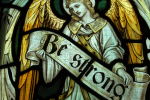November 8, 2013
The Episcopal Church: Who’s at the Top?
 Folks seem to agree that the Episcopal Church is a hierarchical church. But where there seems to be some diversity of opinion is around who or what is at the top of that hierarchy. Where does the “buck stop” so to speak? And in reality, who has the final say?
Folks seem to agree that the Episcopal Church is a hierarchical church. But where there seems to be some diversity of opinion is around who or what is at the top of that hierarchy. Where does the “buck stop” so to speak? And in reality, who has the final say?
Following the Amicus Brief hearings in the Diocese of Fort Worth this past year, this topic became very significant for me. As best as I was able to understand, the argument was not that the Episcopal Church is not hierarchical, but rather simply that the hierarchy of the Episcopal Church rests at the diocesan level. Discussion was engaged around the issue that our church is a diocesan based church--it is not a congregational church, with decisions and governance resting with the local minister and congregation--but rather it is a diocesan based church with decisions and governance resting at that broader level, under the guidance and direction of a Bishop.
This is something I treasure about this denomination: The community that I am part of is bigger than my congregation which meets in "this" part of town--it includes the church that gathers on the south side of town and the west side of town and the rich side of town and the poor side of town--it includes the congregation that is made up of Spanish speakers and the one that is made up of University students. And when we all get together, whether at diocesan annual meetings, or Lenten programs or clergy gatherings, we have a clearer sense of the church of God in our part of the world. Functioning as part of a diocese allows me the chance to take off the blinders that might so easily block my view if I remained only a part of my local congregation. I agree we are diocesan based.
But I do not believe that the diocese is the highest structure in our hierarchical church. I actually believe it is the smallest base unit of our church. It is as a diocese that we participate in the broader church worldwide. It is our diocesan representative, our bishop, who sits on council with all the other bishops from every other diocese in our church. Each diocese is represented when the House of Bishops gathers to discern the will of God together. Nonbishop deputies in the House of Deputies represent each diocese, when they gather to discern the will of God together. Any bishop may end up gathered at Lambeth for consultation in the worldwide Anglican Communion.
And so I asked myself, if we are a hierarchical church, and the diocese is the base unit in that structure, then who or what is at the top of our hierarchy? We do not have a Pope. We acknowledge the Archbishop of Canterbury as the leader of the Church of England and the convener of the Anglican Communion. But that is all. We acknowledge our own presiding bishop as a presiding officer over the House of Bishops, a leader among equals. Our presiding bishop does not have authority to dictate polity, or doctrine. She does not have the authority to consecrate bishops or depose clergy on a whim. We have great respect for the office of the presiding bishop, and appreciate deeply the responsibility that this individual carries, especially in their role as representative of our church to the greater church worldwide. But she, along with all of our bishops, submits to another authority. There are rules and regulations they are all bound by--where are those rules, those policies, those canons coming from?
And then I saw it—coming into view much like an image in a spyglass does as one turns the lens, it was there all along, but it suddenly became clear. At the top of the hierarchy of our church (and answering to God) sits The Council of the Church—as in The General Convention of The Episcopal Church. This council-- of all our bishops and all our deputies from all our diocese--gathers together periodically just as the early councils of the church did, and like the church throughout history, we come together to wrestle with our understanding of scripture, to struggle to get clarity on doctrine and theology, to establish norms for worship and community life, to establish rules for our governance, to hear one another and to seek the guidance of the Holy Spirit on all matters of our common life.
And amidst the chaos and confusion of a thousand different tongues, we pray that the breath of God will inspire us, as the early disciples were inspired as they gathered to wait for the outpouring of God’s spirit in the upper room. And together we talk and we debate, we listen and we pray, we write resolutions and we counter them and finally we take some votes and we pass some resolutions—together. And then we bind our hearts together in one accord to strive to uphold the decisions we have made together, until we meet again.
We are a hierarchical church. We submit our individuality, to our commonality. Each of us submits to all of us—trusting that there is more wisdom in the body of the church as a whole—than there is in any single member.





